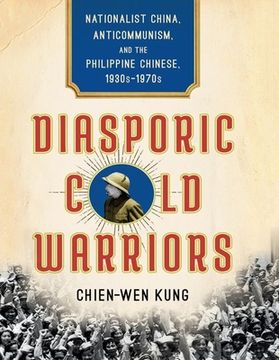Compartir
Diasporic Cold Warriors: Nationalist China, Anticommunism, and the Philippine Chinese, 1930s-1970s (en Inglés)
Chien-Wen Kung
(Autor)
·
Cornell University Press
· Tapa Dura
Diasporic Cold Warriors: Nationalist China, Anticommunism, and the Philippine Chinese, 1930s-1970s (en Inglés) - Kung, Chien-Wen
$ 66.23
$ 82.79
Ahorras: $ 16.56
Elige la lista en la que quieres agregar tu producto o crea una nueva lista
✓ Producto agregado correctamente a la lista de deseos.
Ir a Mis ListasSe enviará desde nuestra bodega entre el
Lunes 03 de Junio y el
Martes 04 de Junio.
Lo recibirás en cualquier lugar de Estados Unidos entre 1 y 3 días hábiles luego del envío.
Reseña del libro "Diasporic Cold Warriors: Nationalist China, Anticommunism, and the Philippine Chinese, 1930s-1970s (en Inglés)"
In Diasporic Cold Warriors, Chien-Wen Kung explains how the Chinese Nationalist Party (Kuomintang) sowed the seeds of anticommunism among the Philippine Chinese with the active participation of the Philippine state.From the 1950s to the 1970s, Philippine Chinese were Southeast Asia's most exemplary Cold Warriors among overseas Chinese. During these decades, no Chinese community in the region was more vigilant in identifying and rooting out suspected communists from within its midst; none was as committed to mobilizing against the People's Republic of China as the one in the former US colony. Ironically, for all the fears of overseas Chinese communities' ties to the PRC at the time, the example of the Philippines shows that the "China" that intervened the most extensively in any Southeast Asian Chinese society during the Cold War was the Republic of China on Taiwan. For the first time, Kung tells the story of the Philippine Chinese as pro-Taiwan, anticommunist partisans, tracing their evolving relationship with the KMT and successive Philippine governments over the mid-twentieth century. Throughout, he argues for a networked and transnational understanding of the ROC-KMT party-state and demonstrates that Taipei exercised a form of nonterritorial sovereignty over the Philippine Chinese with Manila's participation and consent. Challenging depoliticized narratives of cultural integration, he also contends that, because of the KMT, Chinese identity formation and practices of belonging in the Philippines were deeply infused with Cold War ideology.Drawing on archival research and fieldwork in Taiwan, the Philippines, the United States, and China, Diasporic Cold Warriors reimagines the histories of the ROC, the KMT, and the Philippine Chinese, connecting them to the broader canvas of the Cold War and postcolonial nation-building in East and Southeast Asia.

